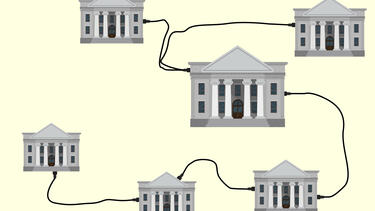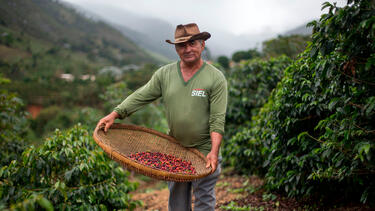Technology
How Millions of Simulated Maps Can Help Us Make Electoral Districts That Feel Fair
Part of resolving the political redistricting stalemate, writes Professor Jamie Tucker-Foltz, is creating congressional maps that align with human intuition about fairness.

When Counting Calories, Words Are More Valuable than Pictures
A new study co-authored by Yale SOM’s Gal Zauberman finds that apps that track calories with a photo are appealing, but manually logging your meals is actually more effective. The results offer a cautionary tale about giving consumers what they think they want, he says.

Stablecoins Survived ‘Crypto Winter,’ But That Doesn’t Make Them Safe
Cryptocurrencies such as Tether, which is pegged to the dollar, have held on as others crashed. But according to new research by Yale SOM’s Gary Gorton, these “stablecoins” still pose major risks to the global financial system.

Is Elon Musk Right about the Bot Problem on Twitter?
Elon Musk’s attempt to buy Twitter has turned into a battle over the prevalence of bot accounts on the platform. We asked Prof. Tauhid Zaman, who has studied the impact of bots, how much they skew the experience of Twitter users.

Why Making Banking Data Portable Isn’t Always Good for Borrowers
In theory, rules requiring banks to share consumer data with third parties increase competition and help consumers. In practice, it’s not so simple, according to a new study co-authored by Yale SOM’s Jidong Zhou.

Will the EU’s New Law Remake Big Tech?
We asked Prof. Fiona Scott Morton, an expert on antitrust policy, what the Digital Markets Act will mean for users in Europe and elsewhere.

What Will It Take to Transition to Electric Cars?
Kenneth Gillingham, professor of environmental and energy economics, says that easing range anxiety and helping drivers understand the advantages of electric can help accelerate the shift.

To Shift Opinions in Online Conversations, Start by Building Trust
New research from Yale SOM’s Tauhid Zaman suggests that starting by establishing common ground makes it possible to make connections and even change some minds.

Can Bias Be Eliminated from Algorithms?
The predictive software used to automate decision-making often discriminates against disadvantaged groups. A new approach devised by Soheil Ghili at Yale SOM and his colleagues could significantly reduce bias while still giving accurate results.

How ‘Stablecoins’ Could Unleash Chaos
Dollar-pegged cryptocurrencies are rapidly proliferating. But without regulation, these so-called stablecoins pose serious risks to the U.S. financial system, argue Yale SOM’s Gary B. Gorton and his co-author.

Blockchain Technology Can Help Consumers Tip Farmers—But Should It?
Apps that track food supply chains could make it easier for customers to tip the farmer who produced their coffee or cocoa. But a new paper suggests that this well-intended feature might reduce farmers’ overall income.
